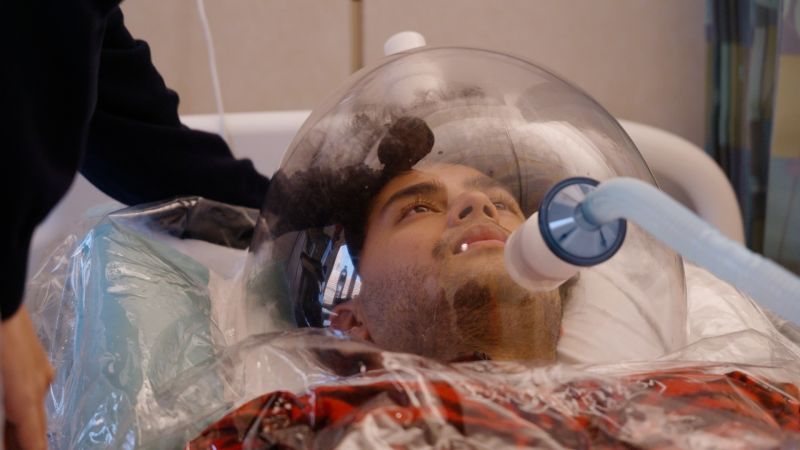Sam Srisatta, a 20-year-old participant, has dedicated one month of his life to a groundbreaking research study focused on ultraprocessed foods, which constitute nearly 70% of the United States’ food supply. Conducted at the National Institutes of Health (NIH) Clinical Center in Bethesda, Maryland, this research aims to unveil the long-term health effects of various types of ultraprocessed foods on human bodies. Each day at 7 a.m., Srisatta undergoes comprehensive monitoring, which includes biometric measurements such as weight and vital signs, alongside an analysis of bowel movements, blood tests, and resting metabolic rates through carbon dioxide and oxygen measurement.
The study entails extensive regulation of both diet and time. Following the morning assessments, Srisatta typically has 15 minutes to consume his breakfast. Subsequently, his meals are meticulously weighed and cataloged, allowing researchers to gather consistent data. He joins 35 other volunteers in this rigorous regimen for a total of four weeks, living in the Metabolic Clinical Research Unit. This randomized clinical trial is crucial for exploring how different ultraprocessed foods might affect health metrics and calorie consumption.
Ultraprocessed foods, as described by Kevin Hall, the lead investigator on this project from the National Institute of Diabetes and Digestive and Kidney Diseases, consist of industrially manufactured concoctions that contain refined ingredients and additives absent from traditional home-cooked meals. Often high in sugar, salt, and fat, ultraprocessed foods are designed to exploit the “bliss point,” which makes them particularly tempting and difficult to resist. This phenomenon echoes the popular advertising slogan from a 1960s Lay’s potato chip campaign featuring Bert Lahr, who famously proclaimed, “Betcha can’t eat just one.”
These palatable concoctions have garnered increasing scrutiny in recent years, as many studies have linked high consumption of ultraprocessed foods to adverse health outcomes, such as obesity, type 2 diabetes, cardiovascular disease, and even certain types of cancer. A recent editorial published by officials from the US Food and Drug Administration emphasized that diet-related illnesses contribute to a staggering $4.5 trillion in annual US healthcare expenses and are responsible for at least half of all deaths in the country.
Yet, scientists face uncertainty regarding whether all ultraprocessed foods carry the same risks, a question that remains contentious. Hall emphasizes the need for clarity regarding the variances among these foods and how they influence health outcomes while pointing out that regulatory actions are stymied by this confusion. Past research indicates that while ultraprocessed diets lead to significant overeating—by an average of 500 calories daily—it’s imperative to understand which components of these diets drive such excessive caloric intake.
This current study builds upon an earlier one, conducted by Hall’s team, where healthy volunteers were fed ultraprocessed foods followed by minimally processed options over two weeks each. Surprisingly, participants consumed an additional 500 calories per day when placed on the ultraprocessed diet, leading to modest weight gain. A different study in Japan corroborated these findings, where participants consumed an extra 813 calories per day while on an ultraprocessed diet.
Moving forward, researchers, including Hall and his colleague Tera Fazzino at the University of Kansas, are focusing on two main theories to explain overeating trends linked to ultraprocessed foods: energy density and hyperpalatability. Energy density pertains to the calorie amount in a given weight of food, while hyperpalatability refers to the heightened sensory appeal of certain foods that drive consumption, often achieved by manipulating combinations of sugar, fat, and salt.
Throughout his daily routine, Srisatta and other volunteers eat meals designed to compare ultraprocessed foods with minimally processed options. His meal types might include seemingly healthy dishes like oatmeal and salads, which may still contain ultraprocessed ingredients, allowing researchers to gauge the participants’ caloric intake and satisfaction levels over time. The findings from this innovative research will eventually contribute to future dietary guidelines set to be released by the federal government.
Overall, experts anticipate a valuable influx of research into the impact of ultraprocessed foods on public health in light of rising global obesity rates, with projections suggesting that over half the world’s population could be overweight or obese by 2035. The investigations conducted by Hall and his team represent a crucial step toward developing effective strategies to counteract the undesirable health effects linked to ultraprocessed diet patterns, and the intricate puzzle of understanding our food environment continues to unfold.



